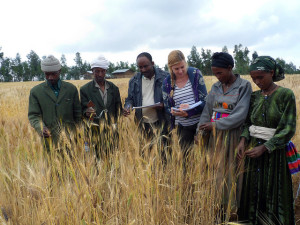Adapted from Agroforestry World blog

Researchers are curious, so they want to know what happens, why it is so and where it is different and … to name only a few of their questions. But research is not only there to satisfy scientific curiosity, of course. Results from research on forests, trees and agroforestry are crucial to help solve many of today’s big development problems.
So how do scientists make their work count?
Amy Cruz, communications officer for the World Agroforestry Centre in the Philippines, has tried to answer this key question for the CGIAR Research Program on Forests, Trees and Agroforestry (FTA).
The simple truth is: talk to people and do it from the beginning – also called “stakeholder engagement”.
‘The more you can engage people at the start, the more projects will be successful,” says Tony Bartlett, Program Manager for Forestry at the Australian Centre for International Agricultural Research (ACIAR).
To expand the reach and impact of research projects, scientists have to bring stakeholders fully on board right at the beginning. This needs time and effort.

The project team should understand the perspectives and drivers that push the stakeholders to act the way they do.
It goes without saying that different people have different needs, but this is relevant because it can be addressed by the project if one knows them from the start. And, on the other hand, different abilities of those involved in the research can contribute positively to the project.
There a several good practices for making research more relevant.
Whatever works
Mapping how stakeholders can contribute to projects and their outcomes is increasingly common. By conducting multi-stakeholder workshops, researchers provide platforms for different partners and beneficiaries to discuss and plan activities. The experiences and lessons learned from the project are then shared amongst the stakeholders as the project progresses, making it easier to identify what works in particular situations.
A good example is the Climate-smart, Tree-based, Co-investment in Adaptation and Mitigation in Asia (Smart Tree-Invest) project.

The project team in the Philippines conducted an outcome mapping activity with the Payments for Environmental Services Working Group (PWG) they helped revitalize in the municipality of Lantapan. Another workshop with the PWG sub-group of sellers, as represented by the village leaders and municipal officials, was also conducted to identify ways they could recruit smallholder farmers as beneficiaries of the co-investment scheme the project is developing.
Bringing together actors with different interests can be particularly effective. A new ACIAR-funded project in Uganda and Zambia is engaging private-sector partners in value-chain innovation platforms to improve food security. This involves mining companies and supermarket networks getting together with farmers and development organizations to co-invest in schemes to improve the income farmers get for their produce.
We are the Champions
‘Champions’, who are typically enthusiastic farmers working with the project, are also important in bringing about change through promoting research within communities and to other organizations. They can advocate the use of research outputs such as new techniques and practices.
As more emphasis is being put on scalability of research, requiring the use of context-specific approaches, champions have to play a crucial role here too.
According to Simone Borelli, the agroforestry officer for the Food and Agriculture Organization (FAO), research institutions should have champions not only at community level but also in the major multilateral institutions, like FAO,. Institutional champions, especially high-level ones, help embed research in development and expand options in a broad range of contexts.
Fergus Sinclair, leader of the Systems Science Domain at the World Agroforestry Centre and coordinator of the FTA livelihoods research, puts emphasis on widening the range of stakeholders.
Think big… or broad

Managing ecosystem services on the ground no longer only means providing decision support for a few key policy makers, he explains. Researchers have to develop support tools for decision making that will serve a broader range of actors. This includes ecosystem-service providers, who are often farmers, intermediaries and, thirdly, those who receive the benefits, such as clean water, reduced flood risk or affordable food.
From the start, researchers also should consider what comes after the project, i.e. exit strategies. With a viable exit strategy, research is a catalyst for durable development that can be maintained locally. Otherwise there may be a risk of dependence on researchers.
So the take away? Only if stakeholders are empowered, research will help them make informed decisions and share their learning from projects with others.











